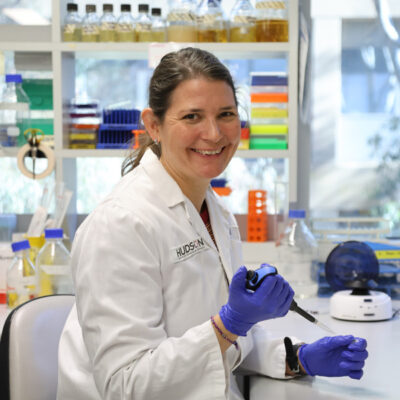Combating drug-resistant bacteria
By Rob Clancy, staff writer
The world is in the midst of another global health crisis, antimicrobial resistance. Field leader Dr Jaclyn Pearson and her team are working on prolonging the effectiveness of a class of drugs, including antibiotics, that the World Health Organization calls ‘the backbone of modern medicine’. Dr Pearson’s goal is to identify the key underlying mechanisms of disease caused by multi-drug-resistant bacteria, in the search for alternative treatment options for serious infections.

“We now face a situation where common infections may again become untreatable because of drug resistant bacteria,” Dr Pearson says.
Drug-resistant bacteria and disease
In August, Dr Pearson published a paper in Nature Communications identifying a group of antibiotic-resistant bacteria that are circulating in humans and livestock in Australia, known as monophasic Salmonella.
“The increase in antimicrobial resistance in Salmonella is co-occurring with increased disease severity in humans. As bacteria become more drug resistant and able to avoid current treatments, they can also cause more severe disease,” she says.
“We need to know how drug-resistant bacteria is happening and intervene to avoid a situation where we have no treatment options for life-threatening infections.”
Collaborators | Australian National University; Monash University; Royal Melbourne Hospital; The Peter Doherty Institute for Infection and Immunity
Funders | National Health and Medical Research Council (NHMRC)
Contact us
Hudson Institute communications
t: + 61 3 8572 2761
e: communications@hudson.org.au
In this article
About Hudson Institute
Hudson Institute’ s research programs deliver in three areas of medical need – inflammation, cancer, women’s and newborn health. More
Hudson News
Get the inside view on discoveries and patient stories
“Thank you Hudson Institute researchers. Your work brings such hope to all women with ovarian cancer knowing that potentially women in the future won't have to go through what we have!”





